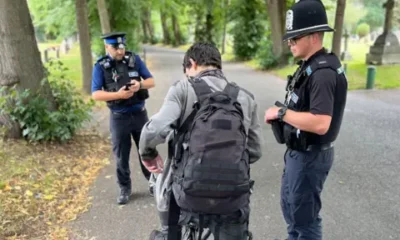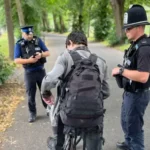Breaking News
New Troubles legacy deal won’t protect paramilitaries, says Starmer

Read more on post.
Gareth GordonBBC News NI political correspondent
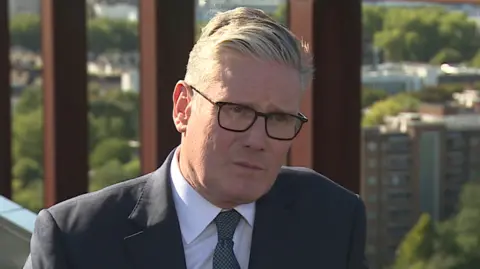 BBC
BBCThe prime minister has insisted new proposals for dealing with the legacy of the Troubles include protections for British Army veterans but not paramilitaries.
Speaking about the plan worked out by the UK and Irish governments, Sir Keir Starmer told BBC News NI he was pleased progress had been made on the issue.
“We have made a provision for veterans in relation to it, the protections have been put in place,” he said.
When asked to clarify if the protections were for everybody who came forward including paramilitaries the prime minister said: “No, it’s for veterans.”
“And obviously we need to make all of the arrangements workable in practice, but the next thing that needs to happen is the necessary legislation to take this forward,” he said.
‘I want this to work’
The prime minister also denied that it has left some people thinking he sees veterans as more important than victims.
“No, not at all,” he said.
Sir Keir said he worked in Northern Ireland for five years so he knows “how important accountability and truth and justice is for all the victims”.
“Other governments have failed on this, the last government badly.
“I want this to work…and I have in my mind’s eye the victims who’ve waited a very, very long time for the accountability that they deserve,” he added.
He also defended his government’s decision to appoint a Dutch conflict resolution expert to explore the merits of talking to paramilitary groups about disbandment.
Fleur Ravensbergen is based at the University of Amsterdam.
She could meet representatives of loyalist and republican organisations over the coming months and will deliver a report next August.
Sir Keir told BBC News NI: “Those paramilitaries are still having impact and effect in some communities in Northern Ireland.
“That is intolerable, and it is our job to do whatever we can to alleviate that for those communities, and that’s the sole purpose of this role.
“So that doesn’t deflect from my condemnation of paramilitaries, not in the slightest.”
The prime minister denied his leadership was “hanging by a thread” amidst reports the Mayor of Manchester Andy Burnham is preparing a leadership challenge.
He also refused to get drawn into the question of whether or not people in Northern Ireland should be able to vote in the Irish presidential election saying: ” I think that’s something that needs to be worked through.”
Analysis: Scrutiny comes at a price
BBC News NI Political Editor Enda McClafferty
It was for Sir Keir Starmer a moment of great jeopardy and opportunity all rolled into one.
Twenty six interviews back to back with all of the UK’s regional political editors was a challenging prospect.
But it also provided a platform to penetrate deep into every corner of the UK with guaranteed air time.
More importantly, it allowed him to focus on the most of local of issues affecting communities which seldom appear on his radar.
But such scrutiny – 130 minutes of constant questions – comes at a price on a day when his leadership is being questioned by his own MPs.
In Northern Ireland, he championed his new Troubles legacy deal with Dublin but made clear veterans would be treated differently than former paramilitaries.
Despite the Irish government insisting everybody who engages with the new legacy bodies will be treated the same.
We await to see how these promises are laid out in legislation which could come within weeks.
He also defended engaging with those paramilitary groups still active in communities and said the “sole purpose of the process” was to alleviate the suffering of those living in fear.
But there was no escaping the questions around his leadership which seem to be growing by the day.
He insisted he will lead the party into the next general election in four years and will face down any challengers to his leadership including the Manchester mayor Andy Burnham who he suggested was driven by his own personal ambition.
It is hard to believe how a party leader with a 150 seat majority at Westminster could be under such pressure.
Breaking News
‘Film me all you want’ – teenage girls with no fear of police torment one High Street
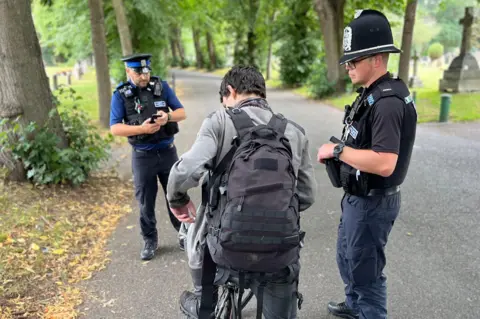
Read more on post.
Dan JohnsonBBC News and
Sophie WoodcockBBC News
 BBC
BBCThe teenager’s sense of invincibility is clear. “The police are never ever going to help you,” she says, “you can film me all you want”.
She’s refusing to leave a shop caught at the centre of a prolonged campaign of antisocial behaviour – windows smashed, items stolen, fires started, staff threatened and attacked.
Muhammad Usman, owner of the mobile phone store in Shirley, near Southampton, is filming her on his own phone – and her juvenile bravado is in full flow. “Touch me and I’ll get you done for assault,” she warns him.
“It’s getting worse, day by day,” Muhammad later tells us from behind his till. His voice cracks, clearly worn down by months of abuse – including, he says, a threat by a teenager to kill him. “I’ve never had this kind of experience in my life before. We’re feeling so helpless.”
What Muhammad and other shopkeepers have experienced over recent months captures the challenge antisocial behaviour poses to police, councils and communities at a time when the government has said tackling it is a key priority.
Three doors down, on the same High Street, Nnenna Okonkwo is also feeling under siege. “It’s ridiculous that it’s just a couple of teenagers causing this mayhem,” she says through tears.

But these don’t seem to be hooded gangsters armed with weapons.
When I eventually encounter the gang, I’m faced with a 14-year-old girl in pink leggings and Crocs.
“I’m not claiming to be innocent because I’m not,” she tells us. “I’ve threatened people and I’ve hit people, I’ll admit to that.”
“The second you get into one bit of trouble with the police, you fall into it too deep and you can’t get out,” she adds.
She says an injury forced her to give up sport and that behaving badly offers an alternative energy release. “I found that I get the same adrenaline boost from being in trouble with the police and being missing and stuff.”
But there’s little remorse. “I regret what I do, but I don’t say sorry,” she says to cheers from the rest of the gang.
She seems bright but deeply troubled. She admits drinking and she’s vaping while we talk. Muhammad had already told us he had experienced racist abuse – something the girl firmly denies being involved in.
One of her friends chimes in. “I know what we’re doing is wrong but we’re teenage kids, we’re going to have a bit of fun,” she tells us. “I’m sorry for most of the people we have damaged, but I have no sympathy… it’s just one way of taking my anger out.”
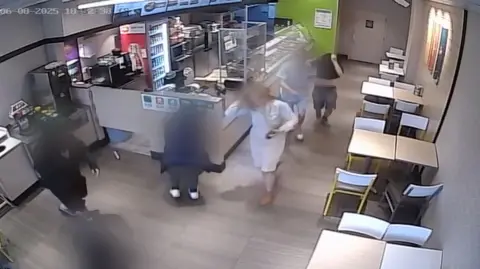
Responding to this BBC report, Prime Minister Keir Starmer said: “Let me be really clear what we’re seeing [in Southampton] is completely unacceptable. That shouldn’t be happening in any community.”
He said people committing anti-social behaviour “should be fearful that they’re going to feel the full force of the law”.
Labour was elected last year promising new “respect orders” to ban similarly persistent offenders from town centres. Due to be introduced under the Crime and Policing Bill currently going through Parliament, breaching the orders would be a criminal offence with potential penalties including a two-year prison sentence, unlimited fines, or unpaid work.
That would partially replace existing civil injunction powers. But the respect orders would not apply to under-18s. An amendment aims to bring that down to 16, but would still not apply to anyone younger.
Ministers have also promised more neighbourhood policing. In Shirley, Muhammad’s complaint is not the number of officers, but their apparent lack of power or willingness to tackle the teenagers. “You don’t see any action against them,” he says. “You feel they are above the law.”
‘We need to be more robust’
The local beat officer, PC Tom Byrne, says he recognises the concern and that antisocial behaviour is being dealt with.
“We do need to remember we are dealing with young people,” he told BBC News in July, saying that while “there will be consequences”, these need to be appropriate when it comes to children.
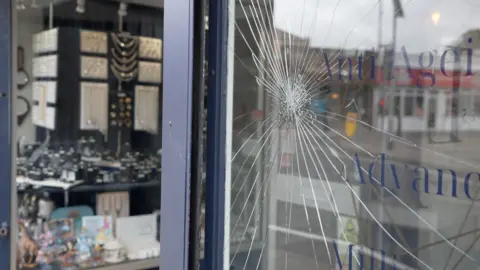
Such instincts to keep young people away from the criminal justice system are deep-rooted in policing – perhaps in the hope antisocial behaviour fizzles out. However, the problem has got worse over the long, hot summer of 2025.
Behaviour like this isn’t just happening on one High Street, and it’s not just teenagers. A few miles along the south coast in Portsmouth, Neil Gibson knows the cost of repeated antisocial behaviour. His car repair business has been hit repeatedly, he believes by the same group of young men. Security camera footage shows one hooded youth hammering a windscreen with a broom until it smashes.
Neil spends some evenings remotely checking his security cameras from home. “I did phone [the police] and say look, if you send someone now, you’ll catch them – perfect situation. I’m afraid they weren’t interested.”
Disheartened, he says he no longer reports every incident.
In nearby Fratton, a former industrial part of Portsmouth now largely residential, we see what the police are up against.
Patrolling the cemetery one evening, PC Chris Middleton attempts to stop a young man zipping down a footpath on an electric scooter – but the masked figure simply ignores the constable and speeds off.
We ask PC Middleton if he can see why some people believe the police are powerless. “Yeah, I feel it,” he says. “At times I really do feel that we need to be more robust and we need more support from the government to tackle these things.”
A short while later, a convicted shoplifter who is wanted on recall to prison walks past – he is searched and arrested.
It’s a similar story for councils, many of whom across the country are using community wardens to keep a grip on antisocial behaviour. Jason, a warden for Portsmouth City Council, tells us “a lot of police stuff is being downgraded to antisocial behaviour”, multiplying his workload.
Cllr Matt Boughton, chair of the Local Government Association’s safer and stronger communities committee, has a similar view – telling BBC News that councils “are increasingly having to step in when police resources are stretched…putting extra pressure on already stretched councils, pressure which is unsustainable”.
How can these issues in the communities we’ve visited – and many others like them across the country – really be solved, then?
‘I regret all of it’
Someone whose role involves working alongside the wider criminal justice system is Donna Jones, Hampshire’s police and crime commissioner (PCC). The former Conservative councillor feels the police need a change of approach to dealing with youths and their parents.
“I think the response from the police, to be absolutely honest with you, has been to take a slightly slower approach but some of these young people are committing some really horrible, nasty offences,” she tells us while visiting shopkeepers in Shirley. She says they are being plagued by “an urban street gang made up of quite a high number of young girls”.
“What we need to be doing is also putting the parents more on the record for some of this stuff too so perhaps some change in legislation that does make parents much more accountable.”
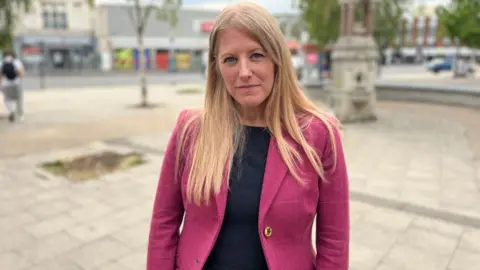
Authorities already possess a range of powers, including civil injunctions, community protection notices, dispersal orders and criminal behaviour orders – the original antisocial behaviour order (ASBO) was replaced in 2014. They can also fine parents and even remove social housing.
But not all of these are applicable to children, and using the ones which are, at scale, will end up criminalising more children. Such measures require time and evidence to obtain, straddling police and councils and concerning often vulnerable young people.
There have been arrests. A teenager has now been charged with 22 offences, including assault, theft, arson, criminal damage, breaching a dispersal order and racially aggravated harassment. The teenager appeared at Southampton Youth Court last week and is due to appear again next month.
After months of persistent antisocial behaviour, the situation in Shirley has calmed down in recent weeks.
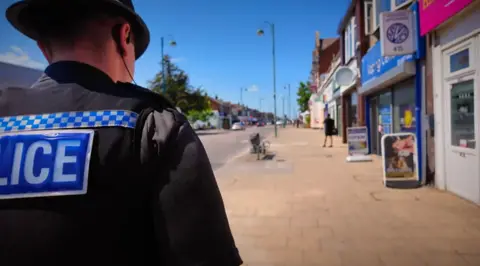
Responding to the BBC, Policing Minister Sarah Jones said “for too long, people have not seen police patrolling their streets”. She said “this government has increased police patrols in high-crime areas across the country through our Safer Streets Summer Initiative”.
Pledging 3,000 more neighbourhood police on the beat by March 2026, she said “we are sending a clear message: crime will be punished”.
And on Thursday the prime minister is due to announce measures to give communities more power to “seize boarded shops” and “block gambling and vape shops on their High Street”.
Hampshire Police told us it had “endeavoured to respond to as many reports as possible” of antisocial behaviour on Shirley High Street but “had to ensure this was balanced against the increase in emergency calls” over the summer months.
Away from the mayhem, we did find some more positive news.
As the summer draws to a close and kids return to school, Jaiden, 15, recalls the hours he spent in a police cell after being arrested. From the sofa of his home in Shirley, he tells us he was causing trouble at shops “nearly every day”.
“It was fun getting people mad but then I realised after a while it wasn’t.”
His mum Kylie says she pleaded with the police to act, having felt she’d lost her son to peer pressure. “Two or three times I asked them ‘just arrest him’. They said we can’t due to his age, we’re going to just have to bring him home. There’s not much we can do.”
He reads the list of rules he and his mum have since signed in a voluntary “acceptable behaviour contract”. They include him not stealing, making threats, or using foul or abusive language and leaving shops when ordered. If he complies, he can avoid court.
Jaiden vows to never go back to that way of life. “I regret all of it,” he says.
Correction: This story has been updated to remove a reference about an earlier court date, involving a teenager, which did not go ahead.
Breaking News
Prime minister unsure if he’ll campaign in Caerphilly
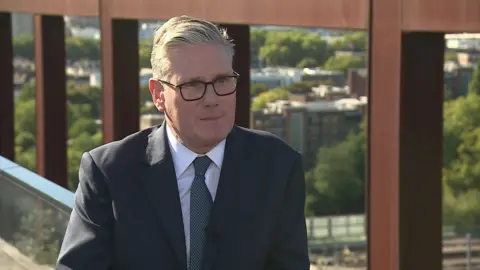
Read more on post.
David DeansWales political reporter
The prime minister has told BBC Wales he does not know whether he will campaign in Caerphilly ahead of the Senedd by-election next month.
Sir Keir Starmer appeared to give his party’s conference at the weekend as a reason why he may not go to the constituency.
Labour faces a fight to retain Caerphilly, which it has held in the Senedd since 1999, and in Westminster since the early 20th century.
The prime minister said there were “huge benefits” to having Labour in power in both the UK and Welsh governments, and that his party has to work hard to “earn every vote”.
Senior figures in political parties often take part in by-election campaigns to help teams on the ground.
The by-election, triggered by the death of the late Labour Member of the Senedd (MS) Hefin David, takes place on 23 October.
Sir Keir’s comments came as the UK government announced a Great Britain-wide fund to provide extra funding for public spaces and high streets.
The UK government announced £214m in new funding in Wales, including £35m for Wales’ 22 local authorities to use over the next two years.
It said nine authorities – including Caerphilly – would receive up to £20m each.
Sir Keir was asked by BBC Wales if he would go to Caerphilly: “I don’t know whether I’m going to Caerphilly. It’s obviously coming up very soon and we’ve got our party conference next week.”
When it was put to him that it was a key by-election, Sir Keir added: “As you know, we’re in Liverpool next week, we’ve got a big party conference coming up.”
Asked if he was an electoral asset there, he added: “I work very well with the first minister, and as long as we keep championing the difference we’re making, that’s what matters.
“Even today in Caerphilly, we’ve announced our Pride in Place fund, which is ten years worth of funding into Caerphilly, and control locally of what that money is spent on.”
‘We have to earn every vote’
Recent opinion polling have suggested Labour is in third place in Wales for the next Senedd election in May, with a recent YouGov survey putting the party on 14%.
Asked if he was worried about being the first Labour leader to lose Wales, he said: “Well we’ve got a long way to go into those elections.
“The most important thing is to be absolutely clear of the huge benefits of having a Labour first minister and a Labour prime minister working together.”
He said the UK government had provided “a record settlement for Wales, the biggest since devolution”, referring to funding for the Welsh government. He said Labour had invested in fixing coal tips, in the railways, in renewable energy and Port Talbot.
When the recent opinion poll was put to him, Sir Keir said: “We have to work hard, we have to earn every vote.
“We did very well in the general election last year. So we’ve shown what we can do.”
Senior Labour figures have recently painted a bleak picture for the party next May, with one suggesting Labour was facing the “biggest kicking” in its history.
Analysis
By Gareth Lewis, Wales political editor
Labour are up against it in Caerphilly in next month’s by-election – a previously safe seat for the party – and you might think a bit of personal door-knocking would be a priority for a PM already looking at dire polling for next year’s Senedd election.
Polls also suggest that Sir Keir is not a popular prime minister and he didn’t directly address whether he thought he would be an electoral asset there.
As for next May his pledge to “earn every vote” is the sort of thing you would expect a politician to say.
But it’s perhaps a tacit acknowledgment that Labour really do have to fight to stay in power after more than a century of hoovering up votes and domination in Welsh politics.
Sir Keir was on home turf for these traditional pre-conference interviews on a skyscraper looming over north London, but his problems lie further afield.
Pride In Place fund
On Thursday the UK government announced the Pride in Place programme will see nine further councils receive £20m each over a decade.
They are:
- Blaenau Gwent
- Neath Port Talbot
- Newport
- Rhondda Cynon Taf
- Caerphilly
- Carmarthenshire
- Conwy
- Cardiff
- Swansea
A total of £1.5m would be made available to each of Wales’ 22 local authorities to spend over two years, except Bridgend which will get £3m.
The scheme is similar to the previous levelling up fund, in that councils have to make bids to the UK government for the cash.
Sir Keir said: “This is a huge investment, but what matters most is who decides how it’s spent: the neighbours, volunteers and parents who know their communities best – the people with real skin in the game.”
List of candidates
Candidates announced so far for the Caerphilly Senedd by-election are:
- Conservatives – Gareth Potter
- Gwlad – Anthony Cook
- Labour – Richard Tunnicliffe
- Plaid Cymru – Lindsay Whittle
- Reform UK – Llŷr Powell
- Welsh Liberal Democrats – Steve Aicheler
- Greens – Gareth Hughes
Breaking News
Starmer vows to lead Labour into Holyrood election

Read more on post.
Glenn CampbellBBC Scotland News political editor and
Angus CochraneBBC News
Sir Keir Starmer has vowed he will lead Labour into the 2026 Holyrood election despite criticism from within his party.
The promise came after Greater Manchester Mayor Andy Burnham said there needs to be “a proper plan for the country” and revealed that some Labour MPs have contacted him to discuss the party leadership.
Speaking to BBC Scotland, the prime minister said he would not comment on Burnham’s “personal ambitions”.
He vowed to deliver change across the UK, and denied that his record in government had derailed Scottish Labour leader Anas Sarwar’s chances of becoming first minister.
Sir Keir also said there was still a chance that Scotch whisky could be exempt from US trade tariffs after he lobbied Donald Trump during his state visit.
After victory north of the border in the 2024 general election, Labour is aiming to return to government in Scotland for the first time since 2007 at next year’s Holyrood election.
However, the party has slipped in the polls since Sir Keir entered Downing Street.
The Holyrood vote will coincide with the Welsh Parliament and English local elections.
Asked if he would lead Labour into all of them, Sir Keir told BBC Scotland: “Yes. When I took over as leader of the Labour Party people told me I couldn’t change the Labour Party, I did.
“When we went into the general election people told me I couldn’t win, we did.
“Now I’m leading the change across the United Kingdom, including delivering better change for Scotland and I’ll continue to do so.”
Sir Keir denied that his unpopularity had ruined Sarwar’s chances of becoming first minister.
“Anas is an excellent candidate who will be incredibly good for Scotland with an absolute focus on delivery,” the prime minister said.
He insisted the pair had worked well together and that they would focus on ousting the SNP from office.
‘Difficult job’
Sarwar, when asked about the prospect of a Labour leadership challenge, told reporters: “I think we should ignore the internal political tittle tattle and get on with delivering for the country.”
The Scottish Labour leader was repeatedly asked if he had full confidence in the prime minister.
He acknowledged that Sir Keir had a “difficult job” and said his biggest criticism of the UK government was that it had achieved “huge successes” but that “very few people had been told about them or know about them”.
Sir Keir denied that he was ruining Sarwar’s chances of becoming first minister and insisted that they “work very closely together”.
He insisted he was delivering for Scotland, citing a £10bn deal for Clyde-built warships to be produced for the Norwegian navy.
 PA Media
PA MediaSpeculation about a Labour leadership bid mounted after Burnham told the Daily Telegraph that Labour MPs had urged him to challenge Sir Keir for the party leadership.
While the Greater Manchester mayor, who is not an MP, said he was not “plotting to get back” to Westminster, he did not rule out a leadership bid.
He later told BBC Radio Manchester: “It’s not up to me, it’s not my decision,” adding that it was a matter for the parliamentary party.
Burnham said that any contest should not focus on personalities and should instead be about a “proper plan for the country, and a proper plan for beating Reform”.
The mayor has proposed raising taxes for higher earners and increasing borrowing to build council houses as he called for the government to “get beyond this thing of being in hock to the bond markets”.
Sir Keir told BBC Scotland: “I’m not going to get drawn into commenting on the personal ambition of the mayor of Manchester.”
He said that fiscal rules were in place to “protect working people” and that economic stability was a “foundational stone” of his government.
“We saw three years ago this week what happened when Liz Truss abandoned fiscal rules,” the prime minister said.
He added: “I’m not going to let that happen under a Labour government.”
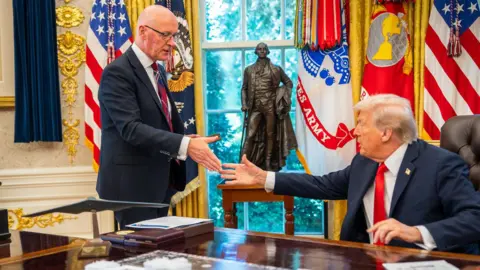 Scottish government
Scottish governmentSir Keir also confirmed that he had lobbied the US president for a tariff exemption on whisky during his state visit to the UK last last week.
The Scottish and UK governments are seeking a reduction or removal of the 10% tariff, which the whisky industry says costs businesses £4m per week.
However, Trump flew back to the US without agreeing a deal.
“I absolutely understand how important it is for Scotland,” the prime minister said.
First Minister John Swinney has also discussed the issue with the US president, including during a recent meeting in the Oval Office.
Speaking to reporters on Thursday, he said he had laid the “groundwork” for a deal and that it was for the UK “to get it over the line”.
Asked about speculation over a Labour leadership challenge, he claimed Sir Keir had “spectacularly misused his opportunity of a landslide win”.
Swinney said: “I’ll allow the Labour Party to fall apart as I lead the SNP to the success that we want to deliver for Scotland.”

The answer you would expect from a Scottish Labour leader when asked if they have full confidence in their UK leader is “yes”.
But that’s not how Anas Sarwar handled that question today.
His response to the BBC’s Lynsey Bews did not include a full throated endorsement of Sir Keir Starmer’s leadership.
Instead, he sounded a little more apologetic. He acknowledged that the prime minister has a “difficult job” and suggested that the UK government needed to do much better at communicating its successes.
That came as a surprise, although it is nowhere close to calling for “wholesale change” as the mayor of Greater Manchester Andy Burnham has done.
Sarwar has dismissed talk of new leadership for the UK party as “tittle tattle” but he will be concerned by the trend in opinion polls that suggest his party is heavily trailing the SNP in voting intentions for next year’s Holyrood elections.
He will also know that the prime minister’s personal poll ratings are extremely low and unlikely to offer Scottish Labour an election bounce.
The prime minister’s hope is that by delivering defence orders for Scottish firms and international trade terms that help Scottish workers, he can still boost the Labour brand.
-
Culture2 days ago
Taylor Swift’s new cinema outing generates more than €12million in just 24 hours
-
Politics2 days ago
European Parliament snubs Orbán with vote to shield Italian MEP from Hungarian arrest
-
Culture2 weeks ago
Life, loss, fame & family – the IFI Documentary Festival in focus
-
Health3 days ago
EU renews support for WHO’s Universal Health Coverage Partnership
-
Culture2 months ago
Fatal, flashy and indecent – the movies of Adrian Lyne revisited
-
Culture2 days ago
Twilight at 20: the many afterlives of Stephenie Meyer’s vampires
-
Environment6 days ago
Key oceans treaty crosses threshold to come into force
-
Culture1 week ago
Farewell, Sundance – how Robert Redford changed cinema forever





